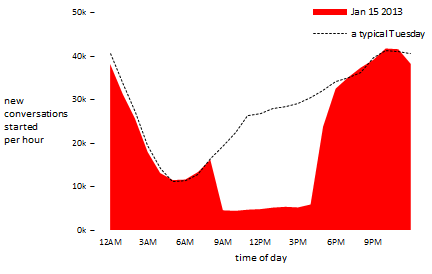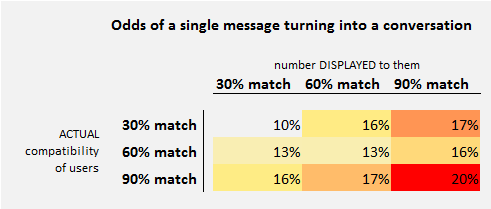'That's how websites work': OkCupid boasts about Facebook-style experiments on users
Co-founder Christian Rudder: “OkCupid doesn’t really know what it’s doing. Neither does any other website. Experiments are how you sort all this out.”

Your support helps us to tell the story
From reproductive rights to climate change to Big Tech, The Independent is on the ground when the story is developing. Whether it's investigating the financials of Elon Musk's pro-Trump PAC or producing our latest documentary, 'The A Word', which shines a light on the American women fighting for reproductive rights, we know how important it is to parse out the facts from the messaging.
At such a critical moment in US history, we need reporters on the ground. Your donation allows us to keep sending journalists to speak to both sides of the story.
The Independent is trusted by Americans across the entire political spectrum. And unlike many other quality news outlets, we choose not to lock Americans out of our reporting and analysis with paywalls. We believe quality journalism should be available to everyone, paid for by those who can afford it.
Your support makes all the difference.Facebook accidentally sparked a media firestorm when it revealed it had been tweaking users’ News Feeds in psychological experiments, and now it seems dating website OkCupid wants in on the act, announcing in a tongue-in-cheek blog post: “We Experiment on Human Beings!”
As you might have guessed from that quotation, the site isn’t shy about its experiments, with co-founder Christian Rudder detailing various schemes including removing all users’ profile pictures for a day and deliberately matching ‘non compatible’ couples just to see what would happen.
“OkCupid doesn’t really know what it’s doing,” writes Rudder. “Neither does any other website. It’s not like people have been building these things for very long, or you can go look up a blueprint or something. Most ideas are bad. Even good ideas could be better. Experiments are how you sort all this out.”
Rudder makes it clear where he stands on the debate over user experimentation, telling readers: “Guess what, everybody: if you use the Internet, you’re the subject of hundreds of experiments at any given time, on every site. That’s how websites work.”
Reactions to Rudder's post have been divided, with some users outraged that OkCupid actively lied to users (especially in deliberately creating ‘bad couples’) while others have pointed out that this sort of experimentation is actually OkCupid’s whole selling point: they actively promise that their algorithms will mine your interests to match you with a perfect partner – it’s the reason their logo is a chemistry beaker.

Rudder details three experiments in the long blog post, the first of which removed users profile pictures as part of a ‘Love is Blind’ holiday. The result was that people responded to messages 44 per cent more often and that contact details were exchanged more quickly. However, when pictures were restored these chats “melted away”.
"The goodness was gone, in fact worse than gone," writes Rudder. "It was like we’d turned on the bright lights at the bar at midnight."
The second experiment looked at how users scored one another for “looks” and “personality”, finding that even if they hadn’t written a single word about themselves in their profile, users “personality” would still be scored roughly the same as if they'd taken the time to list interests and hobbies.
Rudder’s conclusion? “Essentially, the [profile] text is less than 10% of what people think of you. So, your picture is worth that fabled thousand words, but your actual words are worth…almost nothing.”

In the third and final experiment (which has proved the most controversial - as it involves actively lying to the users) couples were told that they were a good match even when OkCupid’s own algorithms suggested they weren’t.
“By all our internal measures, the “match percentage” we calculate for users is very good at predicting relationships,” writes Rudder. “But in the back of our minds, there’s always been the possibility: maybe it works just because we tell people it does. Maybe people just like each other because they think they’re supposed to?”
In the end they found it was a little bit of both: when users were told they were a good match they acted as if they were, exchanging more messages in chat (OkCupid counts a total of four messages as a “real conversation”) but the best result was to spark conversation was to tell good matches that they were good matches. In other words, writes Rudder, “OkCupid definitely works, but that’s not the whole story.”

So what will the users think? OkCupid’s defence that ‘everyone experiments on people online’ is not a justification, especially when the information being tweaked is so personal. But compared to Facebook's research, which was undertaken mainly for the benefit of Facebook, OkCupid’s experiments actually helps users by creating better matches – it's what those who sign up are paying for.
Join our commenting forum
Join thought-provoking conversations, follow other Independent readers and see their replies
Comments